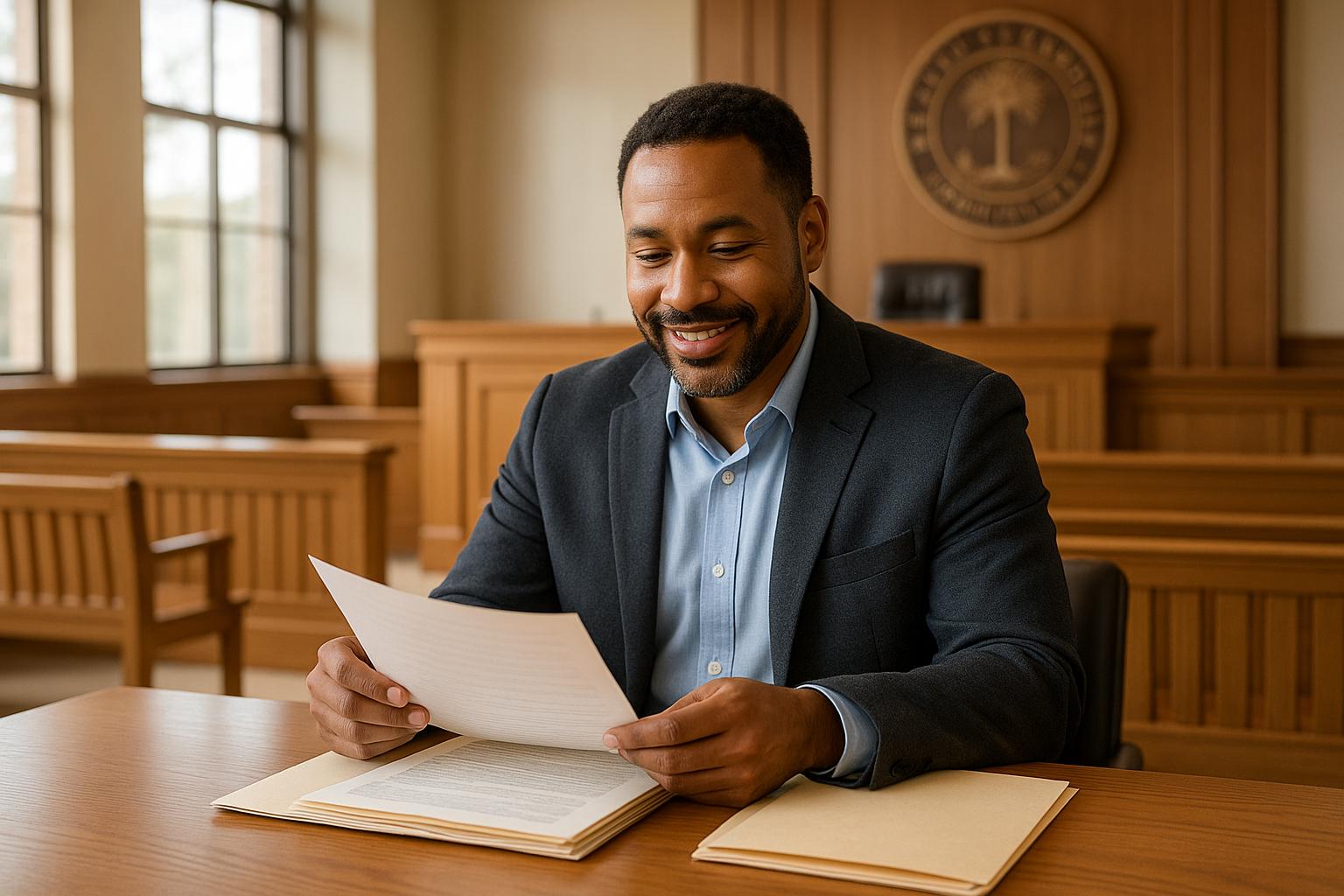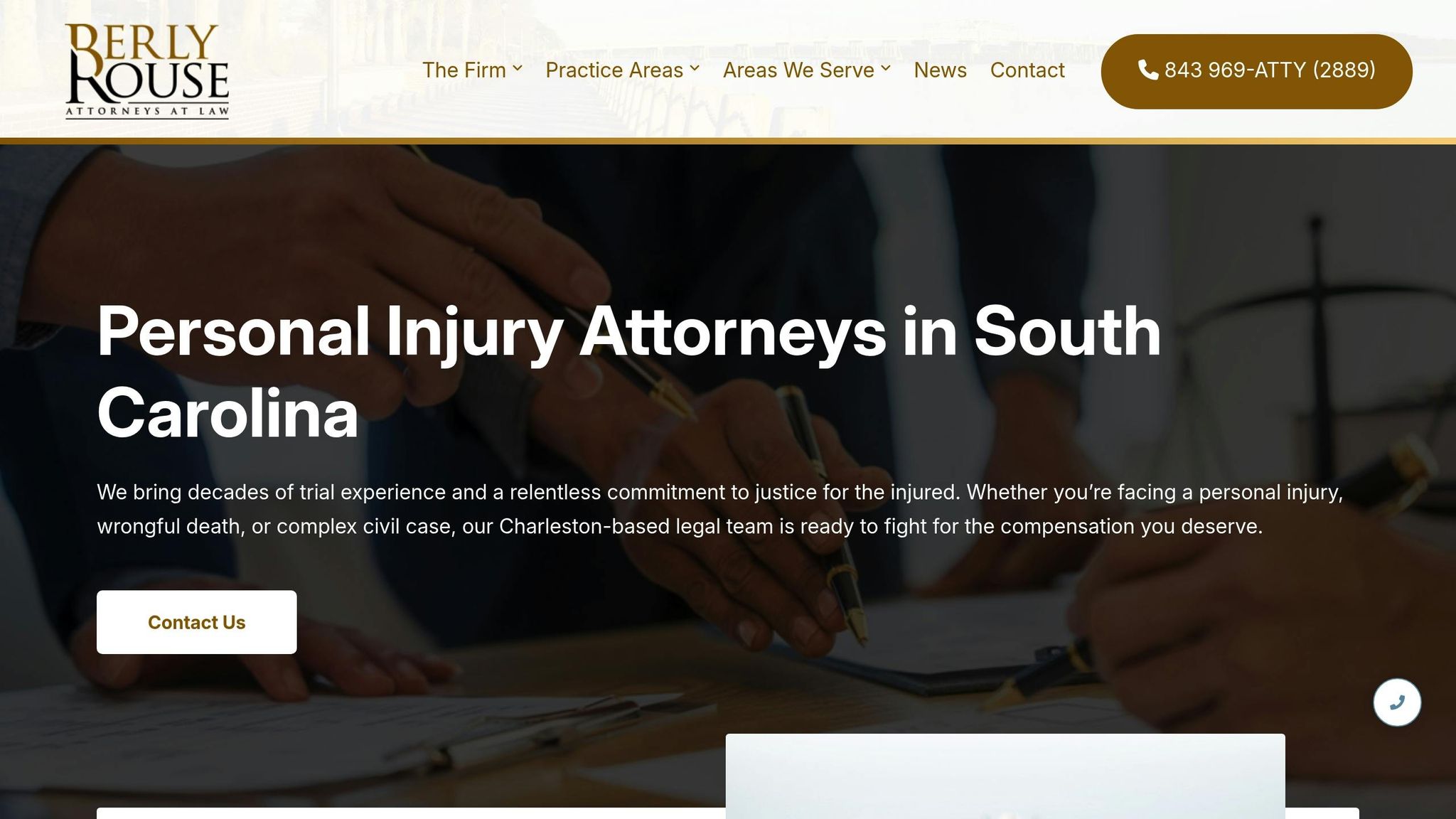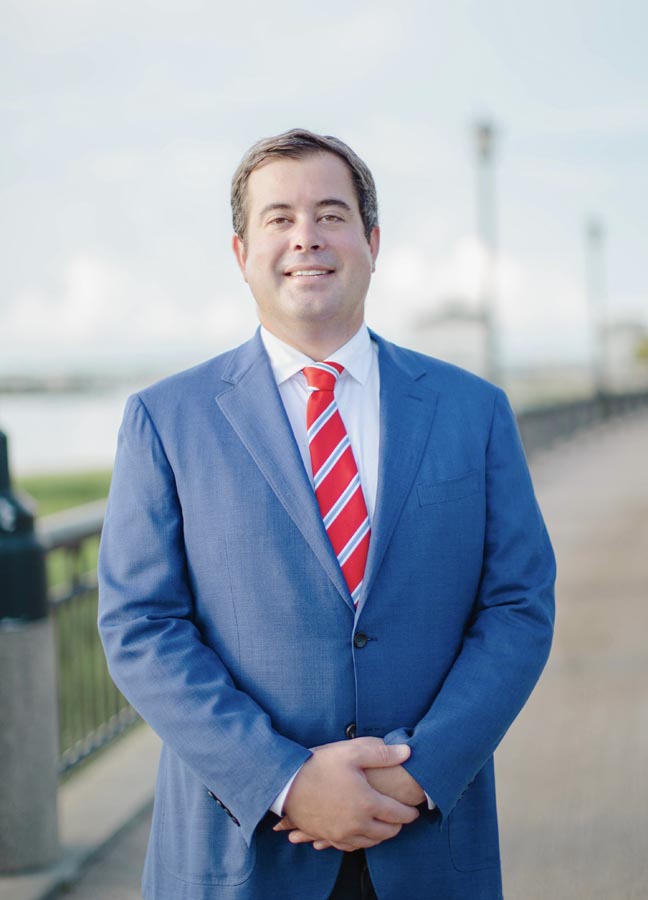what does a personal injury attorney do
Story by Joel Berly
September 1, 2025

Personal injury attorneys help individuals injured due to someone else’s negligence secure compensation for damages like medical bills, lost wages, and pain and suffering. They handle legal complexities, negotiate with insurance companies, and represent clients in court if needed. Here’s what they do:
- Investigate accidents, gather evidence, and consult experts.
- Handle cases like car accidents, slip-and-fall incidents, medical malpractice, and wrongful death.
- Navigate South Carolina’s modified comparative negligence system, where compensation decreases based on fault percentage, and ensure claims are filed within strict time limits (usually 3 years).
- Calculate damages, including future medical costs and non-economic losses like emotional distress.
- Negotiate with insurance companies to counter low settlement offers and, if necessary, take the case to trial.
Their goal is to protect your rights, handle legal challenges, and maximize your compensation so you can focus on recovery.
Personal Injury Law Basics in South Carolina
Understanding the core aspects of personal injury law in South Carolina is key to recognizing how your attorney can help. This area of law revolves around three main principles: negligence, fault, and causation. When someone neglects to act with reasonable care, and that negligence leads to harm, they can be held legally responsible for the resulting damages.
At its heart, negligence occurs when someone fails to behave as a reasonably cautious person would under similar circumstances. Think of a driver running a red light, a landlord ignoring a broken staircase, or a doctor misdiagnosing a condition. Meanwhile, causation requires proving a direct link between the negligent act and your injury – essentially showing that the harm wouldn’t have happened without the defendant’s actions.
The concept of fault is especially important in South Carolina, as the state follows a modified comparative negligence system. This means you can still seek compensation even if you share some responsibility for the incident, as long as your share of fault doesn’t exceed 50%.
Common Types of Personal Injury Cases
Personal injury attorneys in South Carolina handle a range of cases where negligence has caused harm. Among the most frequent are motor vehicle accidents, including car crashes, motorcycle collisions, truck accidents, and incidents involving pedestrians. These cases often require detailed investigations, accident reconstructions, and negotiations with insurance companies to determine liability.
Premises liability cases involve injuries that happen on someone else’s property due to unsafe conditions. Examples include slip-and-fall accidents in stores, dog bites, injuries from poorly maintained swimming pools, or harm caused by inadequate security measures. Property owners are obligated to maintain reasonably safe conditions for visitors.
In medical malpractice cases, healthcare providers can be held accountable for failing to meet expected standards of care. This could involve surgical mistakes, misdiagnoses, medication errors, or birth-related injuries. Similarly, product liability claims arise when defective or unsafe products – like faulty car parts or contaminated food – cause harm.
Other personal injury claims include workplace injuries caused by third-party negligence, which fall outside standard workers’ compensation claims. Wrongful death cases allow surviving family members to seek compensation when a loved one dies due to someone else’s negligence. Across all these scenarios, acting quickly is critical, as strict deadlines apply to filing claims.
Time Limits for Filing Claims in South Carolina
South Carolina enforces specific time limits, known as statutes of limitations, for filing personal injury lawsuits. Generally, you have three years from the date of the injury or accident to file your claim. Missing this deadline typically means you forfeit your right to seek compensation, no matter how strong your case might be.
"If you miss this deadline, your right to pursue a personal injury claim may be forever barred, regardless of the strength of your case."
In some cases, the "discovery rule" applies, meaning the clock starts when you discover – or reasonably should have discovered – your injuries and their connection to the defendant’s actions. This is common in medical malpractice or toxic exposure cases, where harm isn’t immediately apparent. For medical malpractice, the claim must be filed within three years of discovery but no later than six years after the malpractice occurred. Wrongful death claims also have a three-year deadline, starting from the date of death.
Some situations can extend or "toll" the statute of limitations. For instance, if the injured person is under 18, the clock doesn’t start until they turn 18. Mental incapacity can also pause the deadline until the individual regains capacity. Additionally, if the defendant leaves South Carolina for a year or more, that time isn’t counted toward the deadline.
It’s important to note that negotiating with insurance companies does not stop the clock. Only filing a formal lawsuit in court ensures your claim is preserved.
How South Carolina’s Fault Rules Affect Your Case
South Carolina follows a modified comparative negligence system, also known as the "51% Bar Rule." This rule recognizes that multiple parties can share responsibility for an accident and allows you to recover damages as long as your share of fault doesn’t exceed 50%.
If you’re partly at fault, your compensation will be reduced by your percentage of responsibility. For example, if you’re awarded $100,000 in damages but found 20% at fault, your recovery would be reduced to $80,000. However, if you’re 51% or more responsible, you’re barred from receiving any compensation.
Here’s a breakdown of how fault affects compensation:
| Your Fault % |
Defendant’s Fault % |
Damage Award |
Your Award |
Calculation |
| 0% |
100% |
$100,000 |
$100,000 |
$100,000 × 100% = $100,000 |
| 25% |
75% |
$200,000 |
$150,000 |
$200,000 × 75% = $150,000 |
| 50% |
50% |
$100,000 |
$50,000 |
$100,000 × 50% = $50,000 |
| 51% |
49% |
$100,000 |
$0 |
51% > 50% = No compensation |
| 75% |
25% |
$400,000 |
$0 |
75% > 50% = No compensation |
For instance, if a pedestrian jaywalking is hit by a driver distracted by their phone, and the pedestrian is found 20% at fault, a $50,000 damage award would be reduced by 20%, leaving $40,000.
Insurance companies often leverage comparative negligence to minimize their payouts, trying to assign a higher fault percentage to you. This is where having an experienced attorney is critical. A skilled lawyer can gather evidence, challenge unfair fault assessments, and ensure you receive the compensation you deserve.
Proving fault involves examining traffic laws, police reports, witness statements, expert analyses, and physical evidence. The stronger your evidence, the better your chances of minimizing your share of fault and securing fair compensation under South Carolina’s comparative negligence rules. This highlights the importance of having a knowledgeable attorney to guide you through the process.
Main Duties of a Personal Injury Attorney
In South Carolina, personal injury cases operate under negligence and comparative fault standards. Your attorney’s job is to construct a strong case that can withstand scrutiny, guiding you through the legal process while gathering evidence, calculating damages, and negotiating with insurers. Understanding their role helps you see the value they bring and sets realistic expectations for your case.
A personal injury attorney wears many hats – investigator, negotiator, and courtroom advocate. Their expertise ensures your case is built on a solid foundation of evidence and legal strategy.
Gathering Evidence and Building Your Case
One of the first steps your attorney takes is collecting crucial evidence to support your claim. This includes everything from accident scene details to medical records and witness statements. For example, in car accident cases, they’ll gather police reports, traffic camera footage, and photos of the scene, including vehicle damage and road conditions.
In slip-and-fall cases, attorneys act quickly to preserve surveillance video and document hazardous conditions before they’re altered or repaired. They also secure medical records and financial documents to account for both your current costs and future losses.
Witness testimony is another key piece of the puzzle. Attorneys interview eyewitnesses and may bring in experts, such as accident reconstruction specialists or medical professionals, to strengthen your case.
Modern cases often rely heavily on digital evidence, like cell phone records to prove distracted driving, social media posts that contradict injury claims, or data from a vehicle’s black box. Attorneys use advanced tools and forensic experts to retrieve and analyze this information. Additionally, they ensure physical evidence, such as damaged property or defective products, is preserved.
Calculating Damages for Your Claim
After gathering evidence, your attorney determines the value of your claim by analyzing both economic and non-economic damages. This step is critical because it directly affects the compensation you may receive.
Economic damages cover measurable financial losses. Medical expenses are often the largest category, including emergency care, surgeries, medications, and ongoing treatments. Attorneys also calculate future medical costs for permanent injuries requiring long-term care. Lost wages are another major factor. Beyond missed workdays, attorneys consider lost overtime, bonuses, and career advancement opportunities. For self-employed individuals, this involves reviewing business records to estimate income loss.
Non-economic damages, like pain and suffering, are harder to quantify but can significantly impact your case. These damages reflect physical pain, emotional distress, and the overall reduction in your quality of life. Attorneys use methods like per diem calculations or multipliers to assign value to these losses.
For loss of consortium, compensation is awarded to spouses for the strain your injuries place on your relationship. In cases involving permanent disabilities, vocational experts and economists help calculate reductions in lifetime earning capacity. Attorneys also project future damages, accounting for ongoing medical needs, potential complications, and inflation, ensuring your compensation reflects long-term costs.
Dealing with Insurance Companies
Insurance companies are often focused on minimizing payouts, and your attorney is there to counter these tactics. They start by filing a formal claim with the at-fault party’s insurer, submitting a demand package that includes all evidence, medical records, and damage calculations.
Insurance adjusters may try to undervalue your claim by questioning your injuries, requesting unnecessary exams, or blaming pre-existing conditions. Your attorney recognizes these strategies and responds accordingly.
Negotiations with insurers require persistence. Initial offers are often low, designed to tempt you into a quick settlement. Your attorney evaluates these offers against the actual value of your claim and advises whether to accept, counter, or continue negotiating. They handle all communications with the insurer to protect your interests, as adjusters may record conversations or ask leading questions to weaken your case.
In some cases, bad faith insurance practices come into play, such as delaying or denying valid claims. Attorneys can pursue additional compensation for these actions, including punitive damages in severe situations.
Negotiations often involve multiple rounds of offers and counteroffers. Your attorney uses strong evidence, clear liability, and significant damages as leverage to push for fair compensation. Detailed documentation of all communications and offers ensures transparency and strengthens your case.
If the insurance company refuses to settle fairly, your attorney prepares for trial. Often, the threat of litigation is enough to prompt insurers to increase their offers, as trials can be costly and unpredictable. However, when necessary, your attorney will advocate for you in court to secure the compensation you deserve.
Court Representation and Settlement Negotiations
After carefully preparing your case, the next step is pursuing a resolution – either through settlement negotiations or by taking it to court. Building on the evidence and earlier negotiations, your attorney focuses on securing a fair outcome. The majority of personal injury cases are resolved through settlements rather than going to trial. During this phase, your lawyer combines strategic planning and determined advocacy to seek fair compensation while avoiding the costs, delays, and uncertainties of a trial.
Working Out Settlements
Once the evidence is solid and damages have been calculated, your attorney typically sends a demand letter. This document outlines your claim and the legal reasoning behind it [15,17]. Insurance companies often respond with low initial offers. Instead of accepting or outright rejecting these offers, skilled attorneys request written explanations for the insurer’s valuation [15,16,19].
Settlement discussions often require persistence. Insurance companies may deliberately delay negotiations, hoping financial stress or frustration will push you to accept a lower offer. Your attorney counters these tactics by highlighting the strengths of your case, such as clear evidence of liability, serious injuries backed by detailed medical documentation, long-term or permanent effects, and non-economic damages like emotional suffering or diminished quality of life [14,15,17,18].
The possibility of litigation is also a powerful tool during negotiations. Insurance companies generally prefer to avoid the risks and expenses of a trial [16,19]. Attorneys often recommend waiting until you reach Maximum Medical Improvement (MMI) before finalizing a settlement. This ensures that all long-term effects of your injuries are accounted for.
If a fair agreement cannot be reached, your attorney will prepare to take the case to court.
Taking Your Case to Court
When settlement talks fail, the focus shifts to litigation. This process demands thorough preparation, often starting long before court proceedings formally begin [20,24].
Pre-trial preparation involves gathering additional evidence, such as photos, medical records, earnings statements, and expert testimony. Your attorney may also interview eyewitnesses and consult experts in fields like medical care, accident reconstruction, or employment economics to strengthen your case [20,21,24,25].
During the discovery phase, both sides exchange information using legal tools like interrogatories, requests for documents, admissions, and depositions. While this phase can take several months, it ensures that all relevant details are shared before the trial [22,23,24,25,26].
Timely and accurate filing of legal documents is critical throughout this process. Even after a lawsuit is filed, negotiations may continue. As the trial date approaches, insurance companies often become more willing to settle, recognizing the increasing costs and risks of a courtroom battle.
If the case goes to trial, your attorney will present evidence, question witnesses, and simplify complex details – like medical records or accident reconstructions – into clear, persuasive arguments for the judge and jury. While jury trials can be unpredictable, they sometimes result in awards that exceed initial settlement offers.
sbb-itb-7016c6e
Examples of Personal Injury Cases in South Carolina
Real-life examples shed light on how personal injury attorneys approach different types of cases. They show how gathering evidence and negotiating settlements can vary depending on the situation.
Car Accident Cases and Insurance Claims
Car accidents are one of the most frequent personal injury claims in South Carolina. Establishing fault can often become a point of contention. Take a rear-end collision that causes severe injuries: a personal injury attorney might gather police reports, witness accounts, and electronic data to build a case. They could also bring in accident reconstruction experts and medical professionals to demonstrate the extent of the injuries and their long-term effects. With this evidence, the attorney negotiates with the insurance company to secure compensation for medical bills, lost wages, and pain and suffering.
Slip-and-fall cases, like car accidents, depend heavily on thorough evidence to prove liability.
Slip-and-Fall Cases
Slip-and-fall incidents fall under the umbrella of premises liability. In South Carolina, property owners can be held accountable if they fail to address unsafe conditions. For example, if someone slips on a wet floor in a store and sustains serious injuries, the attorney may use surveillance footage, incident reports, and safety records to show that the hazard was ignored. Expert witnesses might also testify that the property owner failed to meet established safety standards. This evidence supports a claim for compensation covering medical care, rehabilitation, and any long-term impact on the victim’s daily life.
Wrongful death cases, however, bring their own set of challenges and require a more comprehensive approach.
Wrongful Death Claims
Wrongful death claims involve helping families seek justice and financial security after losing a loved one in a fatal accident. For instance, a workplace accident might tragically result in a family member’s death. In such cases, an attorney would gather safety reports, expert opinions, and financial analyses to calculate the total loss – both economic and emotional. Whether through settlement discussions or court proceedings, the goal is to ensure the family’s financial stability and acknowledge the profound emotional impact of their loss.
These examples illustrate how personal injury attorneys in South Carolina rely on detailed evidence collection and strategic negotiations to protect their clients’ rights and secure fair compensation under the law.

Choosing the right legal team can make all the difference in the outcome of your case. At Berly Rouse Attorneys, the focus is always on the client. Their approach to personal injury law combines tailored services, relentless advocacy, and a deep understanding of local legal systems. Here’s what makes them stand out:
Comprehensive Legal Support
Berly Rouse Attorneys removes financial obstacles by offering a free initial consultation. During this session, their legal team reviews your case and provides straightforward advice on the best course of action. They work on a contingency fee basis, meaning you only pay if they win your case. Every claim is handled with a customized strategy designed to meet the specific needs of each client.
Personalized Advocacy for Every Client
What sets Berly Rouse Attorneys apart is their commitment to personalized advocacy. They dig into every detail of a case to build the strongest possible argument. Their goal? To secure maximum compensation for clients by accounting for both current and future damages, such as medical bills and lost income. Whether through negotiation or litigation, they fight for settlement offers that truly reflect the value of a claim. Throughout the entire process, clients are kept informed with regular updates and have direct access to their attorneys, easing the stress that often comes with legal proceedings.
Expertise in South Carolina Law
Based in Charleston, Berly Rouse Attorneys brings a wealth of knowledge about South Carolina’s personal injury laws and court systems. With decades of trial experience in both state and federal courts, they are well-equipped to handle a wide range of personal injury cases. Their local insight ensures they can navigate the legal landscape effectively, giving clients confidence that their case is in capable hands.
Why You Need a Personal Injury Attorney
Navigating a personal injury claim can feel overwhelming, especially when dealing with the tactics of insurance companies. Having an attorney on your side can make all the difference.
Without legal representation, you risk accepting lowball settlement offers from insurers – offers that often don’t account for future medical expenses or ongoing treatment needs. Accepting these offers without fully understanding the long-term impact of your injuries can lead to financial strain down the road.
Personal injury law isn’t straightforward. It involves strict deadlines and detailed procedures, where even small mistakes can jeopardize your claim. For example, in South Carolina, most personal injury claims must be filed within three years. Waiting too long can weaken your case as evidence may disappear, and witnesses’ memories may fade.
The financial implications go far beyond immediate medical bills. Compensation could include future medical care, lost wages, diminished earning potential, pain and suffering, and more. An experienced attorney knows how to calculate the full value of your claim. They often work with medical experts and other specialists to build a strong case that reflects the true extent of your losses.
An attorney also helps level the playing field against insurance companies that have significant resources. With a contingency fee arrangement, you don’t pay anything upfront – your lawyer gets paid only if they win your case. This structure eliminates financial barriers and ensures your attorney stays motivated to achieve the best possible outcome for you.
FAQs
How does South Carolina’s modified comparative negligence rule impact my personal injury case?
South Carolina uses a modified comparative negligence rule, allowing you to recover damages if you’re 50% or less at fault for an accident. But if you’re found to be more than 50% responsible, you won’t be eligible for any compensation.
When you share some fault, the amount you can recover will be adjusted based on your percentage of responsibility. For instance, if you’re deemed 20% at fault and your total damages amount to $10,000, you’d receive $8,000. This approach balances accountability with the ability for injured individuals to still pursue compensation, even when they bear part of the blame.
What evidence is essential for a strong personal injury case?
Building a solid personal injury case hinges on collecting the right evidence to back up your claim. Start with medical records that clearly outline your injuries and treatment. Add to that photos or videos of the accident scene, which can paint a vivid picture of what happened, and police reports that offer an official account of the incident.
Don’t overlook the power of witness statements – these firsthand accounts can provide valuable perspectives. Also, any physical evidence from the scene, like damaged property or visible safety hazards, can play a critical role. Acting quickly to gather and safeguard this evidence can make a big difference in the success of your case.
What happens if I miss the deadline to file a personal injury claim in South Carolina?
Missing the deadline – known as the statute of limitations – for filing a personal injury claim in South Carolina can have major repercussions. Once this window closes, you lose the ability to seek compensation through the court system.
This means no recovery for medical bills, lost income, or the pain and suffering tied to your accident. Acting quickly not only ensures your case can proceed but also improves your chances of securing fair compensation. If you’re unclear about your filing deadline, it’s essential to reach out to a personal injury attorney without delay.
Related Blog Posts
Categories: Uncategorized




